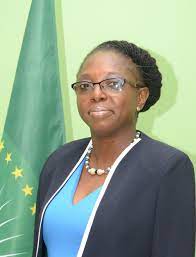
Special Rapporteur on Freedom of Expression and Access to Information in Africa
The African Commission on Human and Peoples’ Rights (ACHPR) outgoing Special Rapporteur on Freedom of Expression and Access to Information in Africa, Commissioner Jamesina Elsie Leonora King, has urged African countries to establish a safe environment in which journalism can be practiced, including by promptly investigating incidents of attacks on media houses, ensuring the protection of journalists and media practitioners, and investigating incidents of violations of their rights.
In her final Inter-Session Activity Report, delivered at the 69th Ordinary Session of the Commission, which was held virtually from November 15 to December 5, 2021, Commissioner King called for the urgent repeal of criminal defamation laws or insult laws which impede freedom of speech, as stipulated in the African Charter on Human and Peoples’ Rights, the Declaration of Principles on Freedom of Expression and Access to Information in Africa, and the Commission’s Resolution 169 on Repealing Criminal Defamation Laws in Africa.
In the 23-page report, presented in accordance with Rules 25(3) and 64 of the Rules of Procedure (2020) of the Commission and covering the period May to November 2021, she also called for the adoption of access to information legislation in line with the regional and international standards elaborated in the Model Law on Access to Information in Africa, and the establishment of mechanisms to ensure their effective implementation.
Commissioner King, a Sierra Leonean jurist, who stepped down as a member of the Commission and its Special Rapporteur on Freedom of Expression and Access to Information during the session, asked African countries to refrain from interrupting or limiting access to telecommunication services such as the Internet, social media and messaging services, especially during electoral period, as noted in the Declaration and in the Commission’s Resolution 363 on the Right to Freedom of Information and Expression on the Internet in Africa.
Saying that the mechanism of the Special Rapporteur had made a lot of progress in protecting and promoting freedom of expression and access to information in Africa, she nonetheless highlighted several challenges to the right, including the existence of libel and defamation laws in a number of countries in Africa, which curtail the right to freedom of expression.
Commissioner King noted the “relatively slow pace of adoption of national legislation on access to information in Africa”, persisting reports of attacks against journalists and other media practitioners, including murder, extra-judicial killing, torture and other forms of ill-treatment, arbitrary arrest and detention, enforced disappearance, kidnapping, intimidation, threats and unlawful surveillance undertaken by State and non-State actors; and increased reports of attacks on media houses, resulting in destruction of property and equipment.
She identified other challenges to include increasing reports of restrictions to the internet, blocking social media platforms or other communications services, or alternatively slowing down internet speeds in Africa countries; lack of responses from State Parties to Letters of Appeal seeking information on alleged violations of Article 9 of the African Charter; the lack of adequate information in State Periodic Reports on measures taken to ensure realization of the right to freedom of expression under Article 9 of the Charter; and need for increased collective commemoration of annual dates related to freedom of expression.
Commissioner King therefore implored African governments to respond to letters of appeal from the Special Rapporteur and provide information and clarification on the alleged violations of the right to freedom of expression under Article 9 of the African Charter.
According to her, African governments need to provide sufficient information on the measures taken by them to ensure the right to freedom of expression under Article 9 of the African Charter, including by referring to the principles contained in the Declaration of Principles.
Commissioner King also called on governments to commemorate annual days touching on the right to freedom of expression under Article 9 of the Charter, including World Press Freedom Day, which is celebrated on May 3 of every year; the International Day for Universal Access to Information on September 28 of every year; and the International Day to End Impunity for Crimes Against Journalists, which is marked on November 2 of every year.
She welcomed the efforts to give effect to the rights contained in the African Charter and the progress made so far, but noted that it is “a continuous journey and I will hope that all
stakeholders will increase efforts to fulfill the collective responsibility to ensure that these rights are fully and meaningfully enjoyed by all.”
Commissioner King said as she was stepping down from the Commission, she had the assurance that it would continue to make strides as it implements its mandate.
The former commissioner was the first Sierra Leonean to be sworn in as a member of the Commission. She was the first Chairperson of the Human Rights Commission of Sierra Leone, where she served as a Commissioner from 1996 to 2016.





